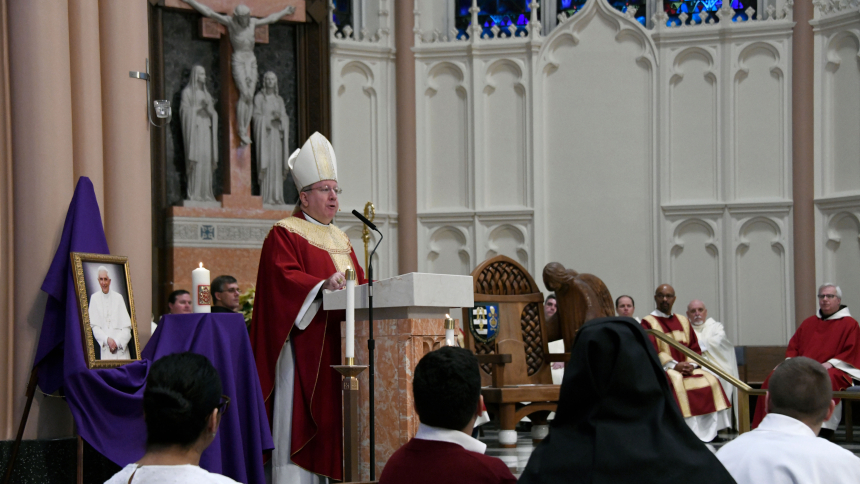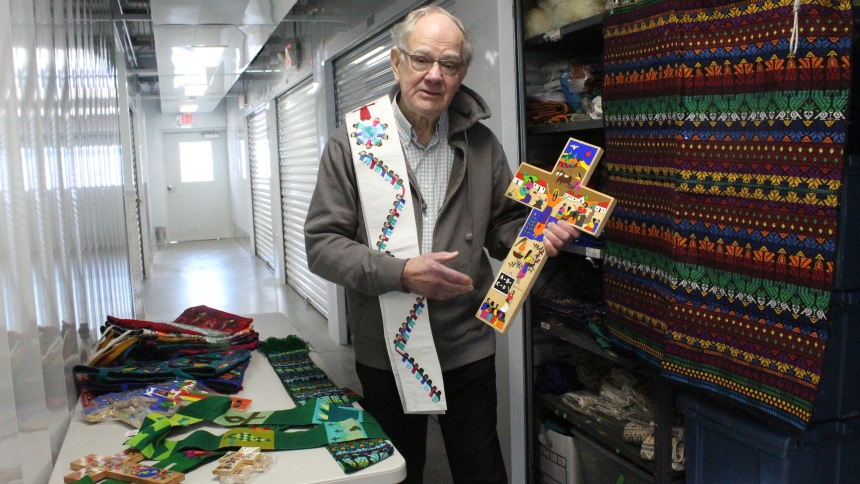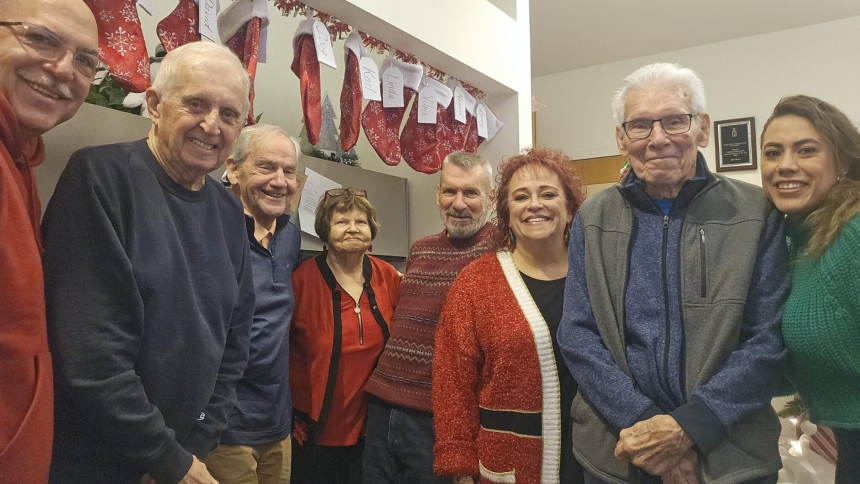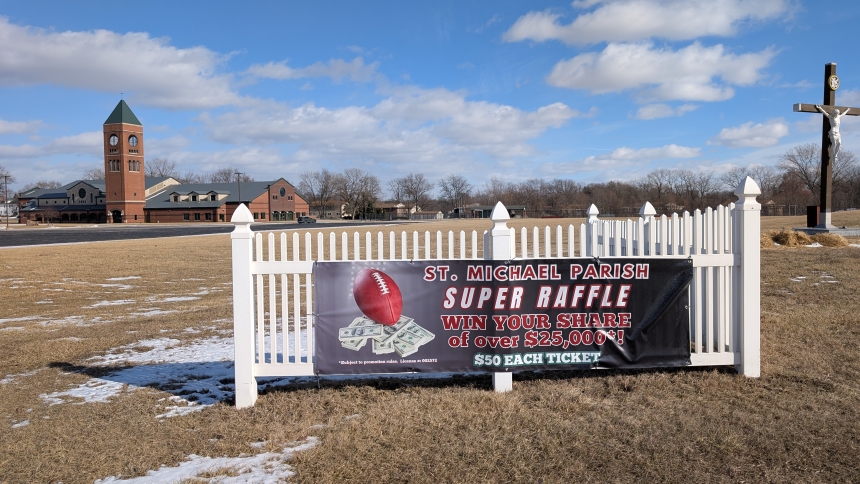
The Diocese of Gary celebrated the life and mourned the death of former Pope Benedict XVI with Memorial Masses held in each of the four deaneries on Jan. 5 and at the Cathedral of the Holy Angels in Gary on Jan. 14 at the conclusion of a nine-day period of mourning.
The local liturgies followed the extraordinary ceremony at St. Peter’s Square in Vatican City on Jan. 5 (2:30 a.m. CST) that saw Pope Francis preside over the funeral of his predecessor, who made history more than a decade ago by announcing his retirement.
Pope Benedict XVI, who was born Joseph Ratzinger in Bavaria, Germany, died on Dec. 31, 2022 at the age of 95.
At the cathedral, Bishop Robert J. McClory discussed in his homily Pope Benedict XVI’s “spiritual testament,” a kind of Last Will and Testament often left by popes to be read upon their death, offering “a reflection on the life they’ve experienced and a word of inspiration,” said the bishop. The former pope’s message, written about 16 months after he was elected pope and 16 years before his death, clearly stated that “Salvation is found in Jesus Christ, and there is no other name than Jesus Christ.”
Speaking of the Jesus of the Gospel, added Bishop McClory, the former pope identified “the love of Jesus and his service to his people. “He is the Way, the Truth and the Life.”
In the testament, written just a year after his retirement, Pope Benedict XVI also gave thanks to God for his guidance, thanked his family and friends, and asked forgiveness “from all those I might have wronged in some way.
Pope Benedict XVI, added the bishop, concluded by advising Catholics to “Stay strong in the faith. Hold strong to the Catholic faith, and hold strong to Jesus.”
Also touching upon what the bishop referred to as the pope’s “most famous homily,” given in 2005 shortly before Cardinal Joseph Ratzinger was elected pope, “He rejected the dictatorship of relativism, exhorting his audience not to recognize anything that has as its goal ‘one’s own ego and desires,’” said Bishop McClory.
“He lived through the century when totalitarianism was let loose in Europe” … but held fast that truth doesn’t depend on someone’s opinion of desires,” added the bishop.
“Faith is first and foremost a personal encounter with Jesus,” the bishop said of Pope Benedict’s belief,” and “If we allow our love of God to change our heart, then we can change others. Jesus is the way, and Pope Benedict lived that truth.”
After the Mass at the cathedral, the Diocese of Gary welcomed Father Jason Welle, OFM, Ph.D., a Franciscan friar, professor and dean at the Pontifical Institute for Arabic and Islamic Studies in Rome, for a presentation on the major contributions of Pope Benedict XVI to the teaching and life of the Church.
He concentrated on four “moments in the life of the former pope as a window into the key themes” of his teachings.
One such moment came during the Second Vatican Council (SVC) in 1962, when he defined the three elements that influenced his life’s work – the lit, the central focus of Jesus Christ and the place of the SVC in the history of the Church.
The second moment came during student protests in 1968, when the former pope expressed a belief in a more Bible-based morality. “He felt the Church should not be so quick to embrace everything modern,” said Father Welle.
In 1986, “facing the movement of liberation theology” as prefect of the Congregation of the Doctrine of the Church, the former pope articulated that “freedom from sin comes through an encounter with Jesus.”
The fourth moment came in an address in Germany in 2006, when Pope Benedict XVI answered affirmatively as to the question of whether God performs rationally. “He says that God acts coherently and reasonably for the good of the world.”
At St. Mary in Crown Pointon Jan. 5, Father Kevin Huber, pastor and chancellor of the diocese, praised Pope Benedict XVI for leading the Church through the “wave of challenge” involving the sexual abuse scandal that rocked the priesthood.
“We owe a tremendous amount of respect and gratitude to Pope Benedict,” he said.
Father Huber also credited the late pontiff with being “interested in the truth and promoting Jesus Christ as the Truth. He gave his entire life to that endeavor.” Strongly opposed to relativism, added Father Huber, Pope Benedict “was a real evangelist who preached the Good News – that Jesus Christ is the Son of God. His life followed that Truth, and that’s why we can come today and every day to celebrate the Eucharist.”
St. Mary parishioner Mary Rzetelny said she came to the Memorial Mass “to honor a holy man. He went through a very difficult time, especially during the Nazi regime in Germany, but he never abandoned the faith, and I believe it made him stronger.
“Pope Benedict and his brother, also a priest, became so faithful that they wished to lead fellow Catholics, and did so with great faith and dignity. His life was a blessing to all people,” she said.
“A wonderful theologian, yet at the same time a gentle and compassionate man,” was how Father David Kime described Pope Emeritus Benedict XVI at Queen of All Saints in Michigan City. Concelebrating with Father Kime, QAS pastor, was Father Nate Edquist, administrator of Holy Family Parish, LaPorte, and Father Bill O’Toole, chaplain at Franciscan Health Michigan City. Nearly 100 people attended.
In light of the deep well of Pope Benedict’s works, Father Kime zeroed in on three central themes of the pontiff’s theological writings. “It would be impossible to summarize in a few moments the beauty of this man and the depth of his theological perception in a short homily,” he explained.
The themes included Pope Benedict’s love of the liturgy. “Pope Benedict understood and lived the mystery of liturgy. We give thanks to Pope Benedict for his insistence on beauty, dignity, and solemnity in the celebration of the Holy Mass,” Father Kime said, also touching on Pope Benedict’s Christo-centric theology and the importance of knowing the Catholic Church in order to know Jesus Christ.
Three generations of the Richie family attended the Queen of All Saints Mass, Shirley Richie, her daughter Karoline Emerick, and two-year-old grandson,Warren.
Richie detailed her closeness to Pope Benedict due to his conservative teachings, and the fact that he was German born, as was her mother. “He was my mom’s pope, being from Germany. So, I always thought a lot of Pope Benedict, too.”
Deacon Michael Green shared that he and his diaconate classmates had ample opportunities to read the works of the late pope emeritus. “I think his writings will take years for the Church to unpack and he’ll be one of the great saints of our Church, and a Church father. This was a man who was full of the Holy Spirit in Jesus Christ and had this mission to spread this love of Jesus Christ.”
Memorial Masses were also celebrated by the deaneries at St. Paul in Valparaiso and Our Lady of Perpetual Help in Hammond.
At the Pastoral Center, Father Christopher Stanish celebrated a Mass for staffers on Jan. 5. “It is beautiful that dioceses around the world are celebrating the Masses of Suffrage. We are gathering together as the Body of Christ to pray for the repose of the soul of Pope Benedict.”
During his homily, the vicar general and moderator of the curia for the diocese acknowledged that some might not understand the need for the special Masses and wonder, “Do we need to pray for the soul of the pope?” The answer, Father Stanish said, is, “Yes. We need to pray for the soul of any of our deceased.”
“The hope is for all of us to be in heaven with our Heavenly Father – that is the hope, that is the goal, that is what all of us want to strive for,” he said. “The reality is because of our brokenness, because of our sinfulness, because of the fact we are not perfect, it means that we need purification.”
Father Stanish alluded to a Scripture passage in which souls are compared to gold that need to be refined in fire. Knowing that gold is typically mixed with earth, dross and other minerals, Father Stanish said he once asked a goldsmith how he knows when the gold is ready. The response, “You know when the gold is ready because when you take it out of the fire you can see your face in it.”
“What a beautiful image that is from Scripture; that our souls are like gold that is being refined in fire, and the fact that God wants to see his face in us, and we’re made in the image and likeness of God,” said Stanish.
He added, “While the hope is that all of us go to heaven, the reality is that we need to be refined, and we need to be purified in such a way. Calling Pope Benedict a faithful servant, Father Stanish said that even the pope was human and was broken and, in that regard, the faithful need to pray for his soul so “the Lord might receive him into his hands and receive him ultimately home into the Father’s house.”
The last time a living pope presided over a rare requiem Mass over a dead pontiff was in 1802. Pope Benedict XVI became the first pope in 600 years to resign from office in February, 2013, acknowledging his “incapacity to adequately fulfill the ministry entrusted” to him. The last decade of his life, which outlasted his eight-year pontificate, was spent in papal retirement at the Mater Ecclesial Monastery in the Vatican Gardens.
Benedict’s personal secretary Archbishop Georg Gaenswein also shared the deceased’s final words, noting that a nurse told him the former pope simply professed his love to God. “With just a whisper of a voice, but in a clearly distinguishable manner, [Benedict] said in Italian, ‘Lord, I love you!’ I was not there at the moment, but the nurse told me about it shortly afterwards,” Gaenswein said, according to “Sky News.”
Honoring Benedict’s request, he was buried in the so-called Vatican grottos, joining nearly 150 of his predecessors under St Peter’s Basilica where John XXIII and John Paul II were interred before their remains were moved to the basilica above.
Correspondent Bob Wellinski and Editor Erin Ciszczon contributed to this story.



